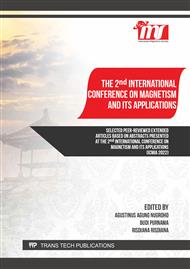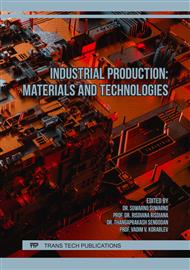[1]
X. Zhao, L. Baharinikoo, M. D. Farahani, B. Mahdizadeh, and A. A. K. Farizhandi, Experimental modelling studies on the removal of dyes and heavy metal ions using ZnFe2O4 nanoparticles, Sci. Rep. 12(2022) 5987.
DOI: 10.1038/s41598-022-10036-y
Google Scholar
[2]
Z. K. Sarkar and F. K. Sarkar, Selective Removal of Lead (II) Ion from Wastewater Using Superparamagnetic Monodispersed Iron Oxide (Fe3O4) Nanoparticles as a Effective Adsorbent, 6.
Google Scholar
[3]
M. A. Barakat, New trends in removing heavy metals from industrial wastewater, Arab. J. Chem. 4 (2011) 361–377.
Google Scholar
[4]
J. Zhao et al., Synthesis of Schiff base functionalized superparamagnetic Fe3O4 composites for effective removal of Pb(II) and Cd(II) from aqueous solution, Chem. Eng. J. 347 (2018) 574–584.
DOI: 10.1016/j.cej.2018.04.151
Google Scholar
[5]
H.-L. Fan, L. Li, S.-F. Zhou, and Y.-Z. Liu, Continuous preparation of Fe3O4 nanoparticles combined with surface modification by L-cysteine and their application in heavy metal adsorption, Ceram.Int. 42 (2016) 4228–4237.
DOI: 10.1016/j.ceramint.2015.11.098
Google Scholar
[6]
F. Fajaroh, I. Desi Susilowati, Nazriati, Sumari, and A. Nur, Synthesis of ZnFe2O4 Nanoparticles with PEG 6000 and Their Potential Application for Adsorbent, IOP Conf. Ser. Mater. Sci. Eng. 515 (2019) 012049.
DOI: 10.1088/1757-899x/515/1/012049
Google Scholar
[7]
H. Kiswanto, A. Puspitasari, E. Suharyadi, T. Kato, and S. Iwata, Effect of Zinc on Crystal Structure and Magnetic Properties of Co1-xZnxFe2O4 Nanoparticles Synthesized by Coprecipitation Method, IOP Conf. Ser. Mater. Sci. Eng. 367 (2018) 012001.
DOI: 10.1088/1757-899x/367/1/012001
Google Scholar
[8]
Y.-J. Tu, T.-S. Chan, H.-W. Tu, S.-L. Wang, C.-F. You, and C.-K. Chang, Rapid and efficient removal/recovery of molybdenum onto ZnFe2O4 nanoparticles, Chemosphere. 148 (2016) 452–458.
DOI: 10.1016/j.chemosphere.2016.01.054
Google Scholar
[9]
W. Konicki, D. Sibera, E. Mijowska, Z. Lendzion-Bieluń, and U. Narkiewicz, Equilibrium and kinetic studies on acid dye Acid Red 88 adsorption by magnetic ZnFe2O4 spinel ferrite nanoparticles, J. Colloid Interface Sci.398 (2013) 152–160.
DOI: 10.1016/j.jcis.2013.02.021
Google Scholar
[10]
R. Sivashankar, A. B. Sathya, K. Vasantharaj, and V. Sivasubramanian, Magnetic composite an environmental super adsorbent for dye sequestration – A review, Environ. Nanotechnol. Monit. Manag. 1–2 (2014) 36–49.
DOI: 10.1016/j.enmm.2014.06.001
Google Scholar
[11]
G. Antarnusa and E. Suharyadi, A synthesis of polyethylene glycol (PEG)-coated magnetite Fe3O4 nanoparticles and their characteristics for enhancement of biosensor, Mater. Res. Express. 7 (2020) 056103.
DOI: 10.1088/2053-1591/ab8bef
Google Scholar
[12]
N. T. Vuong Hoan, N. T. Anh Thu, H. V. Duc, N. D. Cuong, D. Quang Khieu, and V. Vo, Fe3O4/Reduced Graphene Oxide Nanocomposite: Synthesis and Its Application for Toxic Metal Ion Removal, J. Chem. 2016 (2016) 1–10.
DOI: 10.1155/2016/2418172
Google Scholar
[13]
B. Wang, F. Zhang, S. He, F. Huang, and Z. Peng, Adsorption Behaviour of Reduced Graphene Oxide for Removal of Heavy Metal Ions, Asian J. Chem. 26 (2014) 4901–4906.
DOI: 10.14233/ajchem.2014.17024
Google Scholar
[14]
Z. Jia et al., The synthesis of hierarchical ZnFe2O4 architecture and their application for Cr(VI) adsorption removal from aqueous solution, Superlattices Microstruct. 82 (2015) 174–187.
DOI: 10.1016/j.spmi.2015.01.028
Google Scholar
[15]
K. Al Yaqoob, M. Bououdina, M. S. Akhter, B. Al Najar, and J. J. Vijaya, Selectivity and efficient Pb and Cd ions removal by magnetic MFe2O4 (M=Co, Ni, Cu and Zn) nanoparticles, Mater. Chem. Phys. 232 (2019) 254–264.
DOI: 10.1016/j.matchemphys.2019.04.077
Google Scholar
[16]
E.-R. Wang and K.-Y. Shih, Facile Microwave Hydrothermal Synthesis of ZnFe2O4/rGO Nanocomposites and Their Ultra-Fast Adsorption of Methylene Blue Dye, Materials. 14 (2021) 5394.
DOI: 10.3390/ma14185394
Google Scholar
[17]
A. Zamani, M. S. Sadjadi, A. Mahjoub, M. Yousefi, and N. Farhadyar, Synthesis, characterization and investigation of photocatalytic activity of ZnFe2O4@MnO–GO and ZnFe2O4@MnO–rGO nanocomposites for degradation of dye Congo red from wastewater under visible light irradiation, Res. Chem. Intermed. 46 (2020) 33–61.
DOI: 10.1007/s11164-019-03934-w
Google Scholar
[18]
R. R. Nair et al., Reduced graphene oxide/spinel ferrite nanocomposite as an efficient adsorbent for the removal of Pb (II) from aqueous solution, J. Mater. Sci. Mater. Electron.32 (2021) 28253–28274.
DOI: 10.1007/s10854-021-07202-9
Google Scholar
[19]
M. A. Ahmed, M. A. Ahmed, and A. A. Mohamed, Facile adsorptive removal of dyes and heavy metals from wastewaters using magnetic nanocomposite of zinc ferrite@reduced graphene oxide, Inorg. Chem. Commun. 144 (2022) 109912.
DOI: 10.1016/j.inoche.2022.109912
Google Scholar
[20]
K. W. Mas'udah, I. M. A. Nugraha, S. Abidin, A. Mufid, F. Astuti, and Darminto, Solution of reduced graphene oxide synthesized from coconut shells and its optical properties, Minneapolis. (2016) 020045
DOI: 10.1063/1.4945499
Google Scholar
[21]
N. Modaresi et al., Magnetic properties of ZnxFe3−xO4 nanoparticles: A competition between the effects of size and Zn doping level, J. Magn. Magn. Mater. 482 (2019) 206–218.
DOI: 10.1016/j.jmmm.2019.03.060
Google Scholar
[22]
R. C. Sripriya, A. Ezhil, J. Madhavan, and A. R. Victor, Synthesis and Characterization studies of ZnFe2O4 nanoparticles, Mater. Sci.(2017) 6.
Google Scholar
[23]
A. Behera, D. Kandi, S. Mansingh, S. Martha, and K. Parida, Facile synthesis of ZnFe2O4@RGO nanocomposites towards photocatalytic ciprofloxacin degradation and H2 energy production, J. Colloid Interface Sci. 56 (2019) 667–679.
DOI: 10.1016/j.jcis.2019.08.109
Google Scholar
[24]
L. Guo et al., Reduced graphene oxide/α-Fe2O3 composite nanofibers for application in gas sensors, Sens. Actuators B Chem. 244 (2017) 233–242.
DOI: 10.1016/j.snb.2016.12.137
Google Scholar
[25]
Sunaryono et al., Study of Nanostructural, Electrical, and Optical Properties of Mn0.6Fe2.4O4–PEG/PVP/PVA Ferrogels for Optoelectronic Applications, J. Inorg. Organomet. Polym. Mater. 30 (2020) 4278–4288.
DOI: 10.1007/s10904-020-01630-6
Google Scholar
[26]
A. Taufiq et al., Dependence of PEO content in the preparation of Fe3O4/PEO/TMAH ferrofluids and their antibacterial activity, J. Polym. Res. 27 (2020) 117.
DOI: 10.1007/s10965-020-02100-w
Google Scholar
[27]
P. Laokul, V. Amornkitbamrung, S. Seraphin, and S. Maensiri, Characterization and magnetic properties of nanocrystalline CuFe2O4, NiFe2O4, ZnFe2O4 powders prepared by the Aloe vera extract solution, Curr. Appl. Phys. 11 (2011) 101–108.
DOI: 10.1016/j.cap.2010.06.027
Google Scholar
[28]
Y. Yao, J. Qin, Y. Cai, F. Wei, F. Lu, and S. Wang, Facile synthesis of magnetic ZnFe2O4–reduced graphene oxide hybrid and its photo-Fenton-like behavior under visible iradiation, Environ. Sci. Pollut. Res. 21 (2014) 7296–7306.
DOI: 10.1007/s11356-014-2645-x
Google Scholar
[29]
A. Meidanchi and O. Akhavan, Superparamagnetic zinc ferrite spinel–graphene nanostructures for fast wastewater purification, Carbon. 69 (2014) 230–238.
DOI: 10.1016/j.carbon.2013.12.019
Google Scholar
[30]
ST. U. Intan Subadra et al., Preparation and Characterization of Magnetite Nanoparticles Combined with Polyaniline and Activated Carbon, IOP Conf. Ser. Earth Environ. Sci. 276 (2019) 012041 .
DOI: 10.1088/1755-1315/276/1/012041
Google Scholar
[31]
W. Wang, S. Guo, D. Zhang, and Z. Yang, One-pot hydrothermal synthesis of reduced graphene oxide/zinc ferrite nanohybrids and its catalytic activity on the thermal decomposition of ammonium perchlorate, J. Saudi Chem. Soc. 23 (2019) 133–140.
DOI: 10.1016/j.jscs.2018.05.001
Google Scholar
[32]
Kusnunnahari, A. Taufiq, A. Hidayat, R. E. Saputro, and N. Mufti, Preparation and Characterization of Magnetite/PEG Nanoparticles Combined with Curcumin for Drug Delivery Application, Key Eng. Mater. 855 (2020) 299–307.
DOI: 10.4028/www.scientific.net/kem.855.299
Google Scholar
[33]
S. Sunaryono, M. F. Hidayat, N. Mufti, S. Soontaranon, and A. Taufiq, The effect of Mn doping on nano structure and magnetic properties of MnxFe3-xO4-PEG/PVP/PVA based ferrogel, J. Polym. Res. 27 (2020) 284 .
DOI: 10.1007/s10965-020-02065-w
Google Scholar
[34]
Q. Fan, Y. Guan, Z. Zhang, G. Xu, Y. Yang, and C. Guo, A new method of synthesis well-dispersion and dense Fe3O4@SiO2 magnetic nanoparticles for DNA extraction, Chem. Phys. Lett. 715 (2019) 7–13.
DOI: 10.1016/j.cplett.2018.11.001
Google Scholar
[35]
A. R. Vazquez-Olmos et al., Mechanosynthesis of MFe2O4 (M = Co, Ni, and Zn) Magnetic Nanoparticles for Pb Removal from Aqueous Solution, J. Nanomater. 2016 (2016) 1–9.
DOI: 10.1155/2016/9182024
Google Scholar
[36]
D. H. K. Reddy and Y.-S. Yun, Spinel ferrite magnetic adsorbents: Alternative future materials for water purification, Coord. Chem. Rev. 315 (2016) 90–111.
DOI: 10.1016/j.ccr.2016.01.012
Google Scholar
[37]
M. Kosmulski, IEP as a parameter characterizing the pH-dependent surface charging of materials other than metal oxides, Adv. Colloid Interface Sci. 171–172 (2012) 77–86.
DOI: 10.1016/j.cis.2012.01.005
Google Scholar
[38]
X. Zuo et al., Bubble-template-assisted synthesis of hollow fullerene-like MoS 2 nanocages as a lithium ion battery anode material, J. Mater. Chem. A.4 (2016) 51–58.
DOI: 10.1039/c5ta06869j
Google Scholar
[39]
Y. Ren et al., Adsorption of Pb(II) and Cu(II) from aqueous solution on magnetic porous ferrospinel MnFe2O4, J. Colloid Interface Sci. 367 (2012) 415–421.
DOI: 10.1016/j.jcis.2011.10.022
Google Scholar



